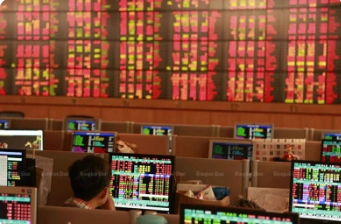New Standards for Mule Accounts in Thailand’s Digital Asset Market
![]() Techmars Key -
Techmars Key - ![]() มีนาคม 26, 2025
มีนาคม 26, 2025

In a move to combat financial crimes and enhance the integrity of Thailand's digital asset market, the Securities and Exchange Commission (SEC), in collaboration with the Thai Digital Asset Operators Trade Association (TDO) and digital asset businesses, has introduced a new industry standard aimed at cracking down on mule accounts. This new regulation addresses the growing concern of criminal groups using digital assets for money laundering, as well as the need to improve the security and transparency of the digital asset trading environment.
In this article, we’ll delve into the reasons behind these new standards, the role of mule accounts in financial crimes, and what this means for Thailand’s digital asset sector moving forward. We’ll also explore the impact of these measures on the local market and how industry players can adapt to these changes.
[caption id="attachment_856" align="aligncenter" width="610"] Mule Accounts[/caption]
Mule Accounts[/caption]
What Are Mule Accounts?
Mule accounts are financial accounts used by criminals to transfer illicit funds, typically without the knowledge of the account holder. These accounts often serve as a middleman in a money laundering scheme, helping criminals disguise the origin of their funds. In the context of digital assets, mule accounts are used to move illicit cryptocurrencies across borders and disguise the nature of the funds.
For example, criminals may instruct individuals, often unwittingly, to open digital wallets or trading accounts, transfer funds into them, and subsequently withdraw or exchange the funds for other digital assets. The ultimate goal is to obscure the original source of the money, making it difficult for authorities to trace the illicit activity.
Mule accounts can be used for a variety of criminal activities, including money laundering, financing terrorism, fraud, and other financial crimes. As the popularity of digital assets grows, so does the opportunity for criminals to exploit these systems for illegal purposes.
The Growing Threat of Mule Accounts in Thailand's Digital Asset Market
Thailand has seen significant growth in its digital asset market, with increasing adoption of cryptocurrencies and blockchain-based assets. However, with this growth comes the risk of digital assets being used for illegal activities, including money laundering. Criminal organizations have recognized the potential of digital assets to facilitate illicit transactions, and mule accounts have become a key tool in these schemes.
The Thai SEC has acknowledged the rising threat of mule accounts in the digital asset space. Criminals have been using these accounts to launder money by moving funds through a series of digital wallets or trading accounts, making it difficult for law enforcement to track the origin of the funds. This has posed a significant challenge for regulators, financial institutions, and digital asset businesses in the country.
According to the SEC, the new industry standard will aim to intercept mule accounts before they can be used for illegal activities. The standard will include measures to detect unusual customer behavior, investigate suspicious accounts, and take action against individuals or entities involved in operating mule accounts.
Collaboration Between Agencies to Combat Mule Accounts
To tackle the issue of mule accounts, the SEC has worked closely with various government agencies and stakeholders. These include the Bank of Thailand, the Cyber Crime Investigation Bureau, the Central Investigation Bureau, the Anti-Money Laundering Office, and the Thai Bankers' Association. This collaborative approach aims to create a comprehensive framework for identifying, monitoring, and addressing the use of mule accounts in digital asset transactions.
Anek Yooyuen, deputy secretary-general of the SEC, stated that as technology crimes continue to threaten the security of financial systems, it is essential for regulatory bodies to work together to prevent the transfer of stolen or illicit funds into digital assets. By developing new standards and measures, the SEC aims to reduce the opportunities for criminals to use digital assets for money laundering and other illegal activities.
These efforts will also facilitate greater cooperation and information exchange between the banking sector and related agencies, enabling a more coordinated and effective approach to tackling mule accounts.
Key Measures in the New Mule Account Standards
The newly introduced industry standard focuses on several key measures to prevent the use of mule accounts in the digital asset market. These include:
-
Detection of Unusual Customer Behavior: The SEC will require digital asset businesses to implement systems and technologies capable of identifying suspicious activities, such as rapid movements of funds or large transactions between accounts with no apparent legitimate purpose. By detecting such behavior early on, regulators and businesses can investigate and take action before illicit funds are transferred or laundered.
-
Account Monitoring and Investigation: Digital asset operators will be tasked with actively monitoring customer accounts for any signs of suspicious activity. In cases where an account is flagged as a potential mule account, the business will need to conduct further investigation to determine the source and destination of the funds. If the account is confirmed to be involved in illegal activities, it will be suspended or terminated.
-
Information Sharing and Collaboration: The new standard emphasizes the importance of information exchange between the digital asset industry, financial institutions, and law enforcement agencies. By sharing information about suspicious accounts and transactions, regulators can quickly identify and take action against mule accounts.
-
Cross-Sector Collaboration: The SEC will continue to work with various agencies to strengthen the enforcement of these measures. This collaboration will help to ensure that both regulatory bodies and businesses are aligned in their efforts to detect and prevent the use of mule accounts in the digital asset market.
What This Means for Digital Asset Businesses in Thailand
The introduction of these new standards will have significant implications for digital asset businesses operating in Thailand. Companies in the sector will need to implement new procedures and technologies to comply with the SEC’s regulations. This may include adopting more advanced anti-money laundering (AML) tools, enhancing their customer verification processes, and training staff to detect and report suspicious activities.
While these changes may present challenges for some businesses, they also offer an opportunity to strengthen the integrity and reputation of Thailand’s digital asset market. By taking proactive steps to prevent money laundering and financial crime, digital asset businesses can demonstrate their commitment to compliance and build trust with customers and regulators.
The Impact on Thailand's Digital Asset Market
The SEC’s efforts to combat mule accounts and money laundering are expected to have a positive impact on the digital asset market in Thailand. By establishing clear guidelines and standards for the industry, the SEC is fostering a more secure and transparent environment for digital asset trading.
In the long term, these measures could help attract more institutional investors and mainstream users to the digital asset market, as concerns about illegal activities are addressed. Furthermore, as the industry matures and becomes more regulated, it will likely see greater international recognition and acceptance.
The introduction of these standards also reflects the growing recognition of digital assets as a legitimate and integral part of the global financial system. As governments and regulators continue to refine their approaches to digital assets, Thailand’s forward-thinking policies could position the country as a leader in the safe and responsible adoption of blockchain-based technologies.
Conclusion
The SEC’s new standards for mule accounts are a significant step toward ensuring the integrity of Thailand’s digital asset market. By cracking down on the use of digital assets for money laundering, the regulator is helping to create a safer and more secure environment for both businesses and consumers. While the implementation of these measures will require adjustments from digital asset operators, they represent an important milestone in the ongoing effort to regulate and protect the rapidly growing digital asset space in Thailand.
With increased collaboration between regulatory bodies, businesses, and law enforcement, Thailand is poised to establish a robust framework for the responsible use of digital assets, ensuring that criminals are held accountable while fostering a legitimate and thriving market.
See more articles
Royal Casino: คู่มือสุดพิเศษสำหรับการพนันออนไลน์


 New Chayapak[/caption]
New Chayapak[/caption]
 New Chayapak[/caption]
New Chayapak[/caption]





 New Policy on the Alcohol Ban[/caption]
New Policy on the Alcohol Ban[/caption]


